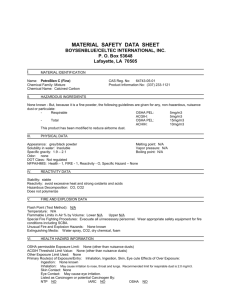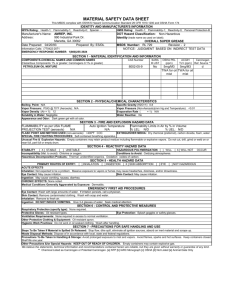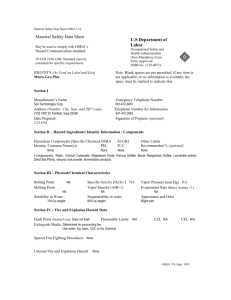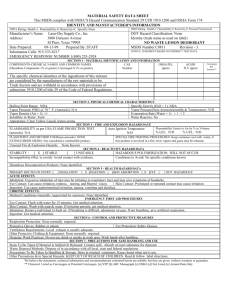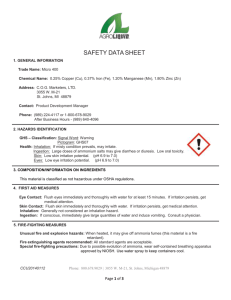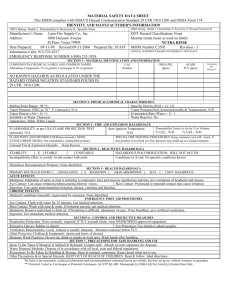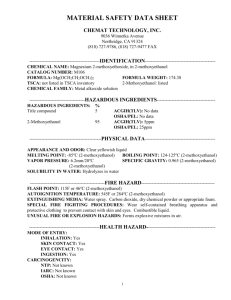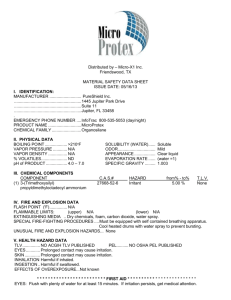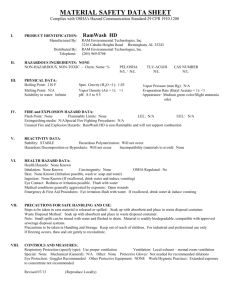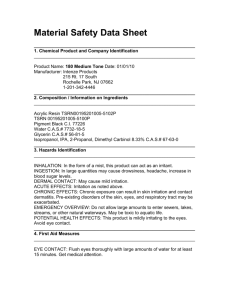Borrada D MSDS Sheet - Do It Yourself Pest Control
advertisement
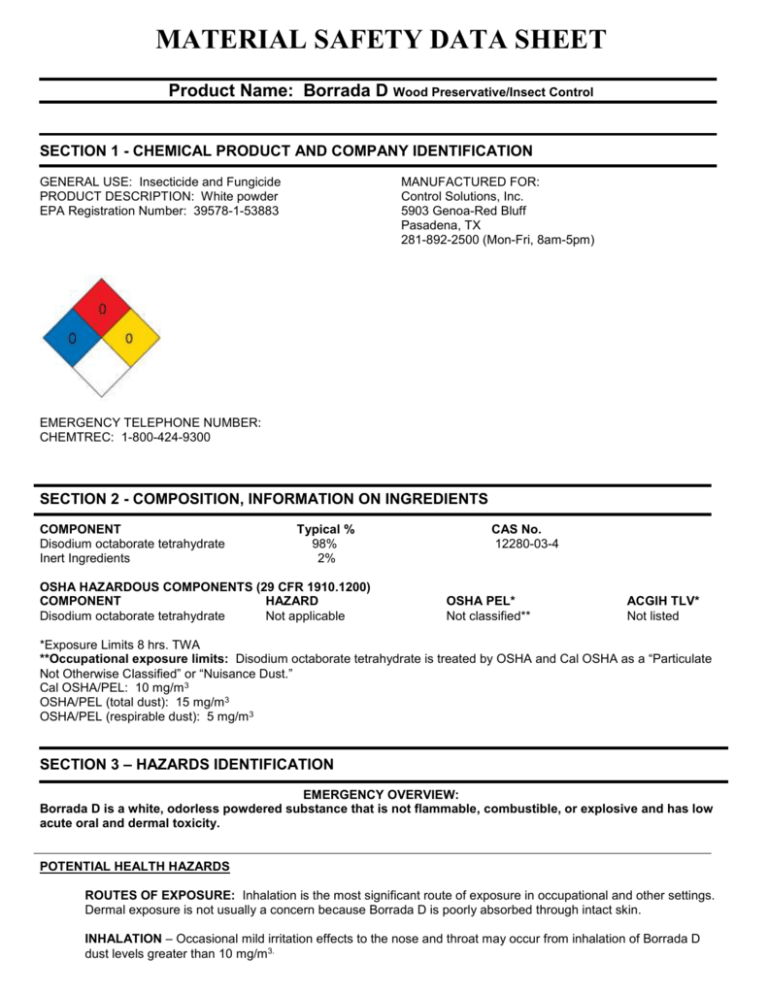
MATERIAL SAFETY DATA SHEET Product Name: Borrada D Wood Preservative/Insect Control SECTION 1 - CHEMICAL PRODUCT AND COMPANY IDENTIFICATION GENERAL USE: Insecticide and Fungicide PRODUCT DESCRIPTION: White powder EPA Registration Number: 39578-1-53883 MANUFACTURED FOR: Control Solutions, Inc. 5903 Genoa-Red Bluff Pasadena, TX 281-892-2500 (Mon-Fri, 8am-5pm) EMERGENCY TELEPHONE NUMBER: CHEMTREC: 1-800-424-9300 SECTION 2 - COMPOSITION, INFORMATION ON INGREDIENTS COMPONENT Disodium octaborate tetrahydrate Inert Ingredients Typical % 98% 2% OSHA HAZARDOUS COMPONENTS (29 CFR 1910.1200) COMPONENT HAZARD Disodium octaborate tetrahydrate Not applicable CAS No. 12280-03-4 OSHA PEL* Not classified** ACGIH TLV* Not listed *Exposure Limits 8 hrs. TWA **Occupational exposure limits: Disodium octaborate tetrahydrate is treated by OSHA and Cal OSHA as a “Particulate Not Otherwise Classified” or “Nuisance Dust.” Cal OSHA/PEL: 10 mg/m3 OSHA/PEL (total dust): 15 mg/m3 OSHA/PEL (respirable dust): 5 mg/m 3 SECTION 3 – HAZARDS IDENTIFICATION EMERGENCY OVERVIEW: Borrada D is a white, odorless powdered substance that is not flammable, combustible, or explosive and has low acute oral and dermal toxicity. POTENTIAL HEALTH HAZARDS ROUTES OF EXPOSURE: Inhalation is the most significant route of exposure in occupational and other settings. Dermal exposure is not usually a concern because Borrada D is poorly absorbed through intact skin. INHALATION – Occasional mild irritation effects to the nose and throat may occur from inhalation of Borrada D dust levels greater than 10 mg/m3. EYE CONTACT – Borrada D is non-irritating to the eyes in normal use. SKIN CONTACT - Borrada D does not cause irritation to intact skin. INGESTION – Products containing disodium octaborate tetrahydrate are not intended for ingestion. Borrada D has a low acute toxicity. Small amounts (e.g. a teaspoon) swallowed accidentally are not likely to cause effects; swallowing amounts larger than that may cause gastrointestinal symptoms. CANCER- Disodium octaborate tetrahydrate is not a known carcinogen. See Section 11 for additional toxicological information. SECTION 4 - FIRST AID MEASURES INHALATION: If symptoms such as nose or throat irritation are observed, remove person to fresh air. EYES: Use eye wash fountain or fresh water to cleanse the eye. If irritation persists for more than 30 minutes, seek medical attention. SKIN: No treatment necessary because non-irritating. INGESTION: Swallowing small quantities (one teaspoon) will cause no harm to healthy adults. If larger amounts are swallowed, give two glasses of water to drink and seek medical attention. SECTION 5 - FIRE FIGHTING MEASURES GENERAL HAZARD: None, because Borrada D is not flammable, combustible or explosive. The product itself is flame retardant. FLAMMABILITY CLASSIFICATION (29 CFR 1910.1200): Non-flammable solid. HAZARDOUS COMBUSTION PRODUCTS: None. EXTINGUISHING MEDIA: Any fire extinguishing media may be used on nearby fires. SECTION 6 - ACCIDENTAL RELEASE MEASURES GENERAL: Borrada D is a water-soluble white powder that may, at high concentrations, cause damage to trees or vegetation by root absorption. (Refer to Section 12 for ecological information.) LAND SPILL: Vacuum, shovel or sweep up Borrada D and place in containers for disposal in accordance with applicable local regulations. Avoid contamination of water bodies during cleanup and disposal. Personal protective equipment is not needed to cleanup spills. SPILLAGE INTO WATER: Where possible, remove any intact containers from the water. Advise local water authority that none of the affected water should be used for irrigation or for the abstraction of potable water until natural dilution returns to the boron value to its normal environmental background level. Borrada D is a non-hazardous waste when spilled or disposed of, as defined in the Resource Conservation and Recovery Act (RCRA) regulations (40 CFR 261). (Refer to Section 15 for additional regulatory information.) SECTION 7 - HANDLING AND STORAGE KEEP OUT OF REACH OF CHILDREN. HANDLING: Borrada D is a stable product. No special handling precautions are required. STORAGE: Dry, indoor storage is recommended. To maintain package integrity and to minimize caking of the product, containers should be handled on a first-in, first-out basis. Good housekeeping procedures should be followed to minimize dust generation and accumulation. SECTION 8 - EXPOSURE CONTROLS, PERSONAL PROTECTION ENGINEERING CONTROLS: Use local exhaust ventilation to keep airborne concentrations of Borrada D dust below permissible exposure levels. PERSONAL PROTECTION: Where airborne concentrations are expected to exceed exposure limits, NIOSH/MSHA certified respirators should be used. Eye goggles and gloves are not required for normal industrial exposures, but may be warranted if environment is excessively dusty. Occupational exposure limits: Disodium octaborate tetrahydrate is treated by OSHA and Cal OSHA as a “Particulate Not Otherwise Classified” or “Nuisance Dust.” Cal OSHA/PEL: 10 mg/m3 OSHA/PEL (total dust): 15 mg/m3 OSHA/PEL (respirable dust): 5 mg/m 3 SECTION 9 - PHYSICAL AND CHEMICAL PROPERTIES PHYSICAL STATE: Solid APPEARANCE: White powder ODOR: Odorless BULK DENSITY: 320 to 480 kg/m3 VAPOR PRESSURE (mm/Hg): Negligible @ 20 C SOLUBILITY IN WATER: 9.7% @ 20 C 34.3% @ 20 C MELTING POINT: 815 C pH @ 20 C: 8.3 (3.0% solution) 7.6 (10% solution) SECTION 10 - STABILITY AND REACTIVITY CHEMICAL STABILITY (Conditions to avoid): Stable INCOMPATIBILITY: Reaction with strong reducing agents, such as metal hydrides or alkali metals, will generate hydrogen gas, which could create an explosive hazard. HAZARDOUS DECOMPOSITION PRODUCTS: None. HAZARDOUS POLYMERIZATION: Will not occur. SECTION 11 - TOXICOLOGICAL INFORMATION The following information is available for the formulation: INGESTION: Oral LD50 (rat) >3898 mg/kg males >4901mg/kg females >4305 mg/kg combined ORAL: Dermal LD50 (rat) >5050 mg/kg INHALATION: Inhalation LC50 (rat) >2.32 mg/L SENSITIZATION: Skin sensitization (guinea pig) -Not considered a sensitizer IRRITATION: Primary eye irritation (rat) Primary skin irritation (rat) -Minimal effects clearing within 24 hours -Score: 0.1m-No irritation at 72 hours SECTION 12 - ECOLOGICAL INFORMATION EXOTOXICITY DATA General: Boron (B) is the element in disodium octaborate tetrahydrate (Borrada D) which is used by convention to report borate product ecological effects. It occurs naturally in seawater at an average concentration of 5 mg B/L and generally occurs in freshwater at concentrations up to 1 mg B/L. In dilute aqueous solutions the predominant boron species present is undissociated boric acid. To convert disodium octaborate tetrahydrate into the equivalent boron (B) content, multiply by 0.2096. Phytotoxicity: Boron is an essential micronutrient for healthy growth of plants; however, it can be harmful to boron sensitive plants (e.g. grass and ornamentals) in high quantities. SECTION 13 – DISPOSAL CONSIDERATIONS DISPOSAL: Consult state and local authorities for disposal guidelines. RCRA (40 CFR 261): Borrada D is not listed under any sections of the Federal Resource Conservation and Recovery Act (RCRA). SECTION 14 – TRANSPORTION INFORMATION DOT Class: UN Number: Not regulated Not regulated PACKAGING General description: 1 lb paper or plastic bags; 1 lb plastic jug; 25 lb and 40 lb pails; 1000lb totes (mini-bulk) SECTION 15 - REGULATORY INFORMATION U.S. FEDERAL REGULATIONS: This product is registered with the EPA (EPA Reg. No. 39578-1-53883) in accordance with Section 3 of FIFRA, as a pesticide product. U.S. EPA TSCA Inventory: 12008-41-2 OSHA/Cal OSHA: This MSDS document meets the requirements of both OSHA (29 CFR 1910.1200 and Cal OSHA (Title 8 CCR 5194(g)) hazard communication standards. Refer to Sections 2 and 8 for regulatory exposure limits. CHEMICAL INVENTORY LISTING: Disodium octaborate tetrahydrate (Borrada D), 12280-03-4, appears on several chemical inventory lists (including the EPA TSCA inventory, Canadian DSL, European EINECS, Japanese MITI, Australian and Korean lists) under the CAS No. representing the anhydrous form of this inorganic salt. U.S. EPA TSCA Inventory 12008-41-2 Canadian DSL 12008-41-2 EINECS 234-541-0 South Korea 9312-3213 SARA TITLE III DATA Sections 311 & 312 Hazard Categories: Immediate Health Hazard - No Delayed Health Hazard – No Fire Hazard – No Reactive Hazard – No Sudden Pressure Release Hazard - No Section 302 Extremely Hazardous Substances: None Section 313 Toxic Chemicals: None CERCLA/EHS Reportable Quantities (RQ): None STATE REGULATIONS: CALIFORNIA (Proposition 65): None SECTION 16 - OTHER INFORMATION MSDS Status: Date of this Revision: July 13, 2005 Date of Previous Revision: New MSDS Person Responsible for Preparation: Joe Blake Reasons for Revision: New product DISCLAIMER: This information is provided for the limited guidance to the user. While Control Solutions, Inc. believes that the information is, as of the dare hereof, reliable, it is the user’s responsibility to determine the suitability of the information for its purposes. The user is advised not to construe the information as absolutely complete since additional information may be necessary or desirable when particular, exceptional, or variable conditions or circumstances exist (like combinations with other materials), or because of applicable regulations. No express or implied warranty of merchantability or fitness for a particular purpose or otherwise is made hereunder with respect to the information or the product to which the information relates. ABBREVIATIONS: a.i. ACGIH CERCLA EPA FIFRA IARC NTP SARA TSCA DOT IMDG IATA Active Ingredient American Conference of Governmental Industrial Hygienists Comprehensive Environmental Response, Compensation, and Liability Act Environmental Protection Agency Federal Insecticide, Fungicide, and Rodenticide Act International Agency for Research on Cancer National Toxicology Program Superfund Amendments and Reauthorization Act Toxic Substances Control Act Department of Transportation International Maritime Dangerous Goods International Air Transport Association
